Icon College: Entrepreneurship and Small Business Management Report
VerifiedAdded on 2023/01/18
|18
|5208
|94
Report
AI Summary
This report provides a comprehensive analysis of entrepreneurship and small business management, covering various aspects of entrepreneurial ventures. It begins by examining different types of ventures, including public, private, and voluntary organizations, and exploring their similarities and differences. The report then delves into the specifics of small business entrepreneurship, scalable startup entrepreneurship, large company entrepreneurship, and social entrepreneurship, highlighting their characteristics and suitability for different entrepreneurial typologies. It further explores the differences and similarities between small, medium, and macro businesses, analyzing their goals, risks, structures, and employee numbers. The report also interprets and assesses relevant data and statistics to illustrate the impact of micro and small businesses on the economy, particularly in the UK, emphasizing their contribution to employment and turnover. Finally, it discusses the importance of small businesses and startups to the growth of the social economy, and explores the characteristic traits, skills, motivations, and backgrounds of successful entrepreneurs.

Entrepreneurship and Small
Business Management
Business Management
Paraphrase This Document
Need a fresh take? Get an instant paraphrase of this document with our AI Paraphraser
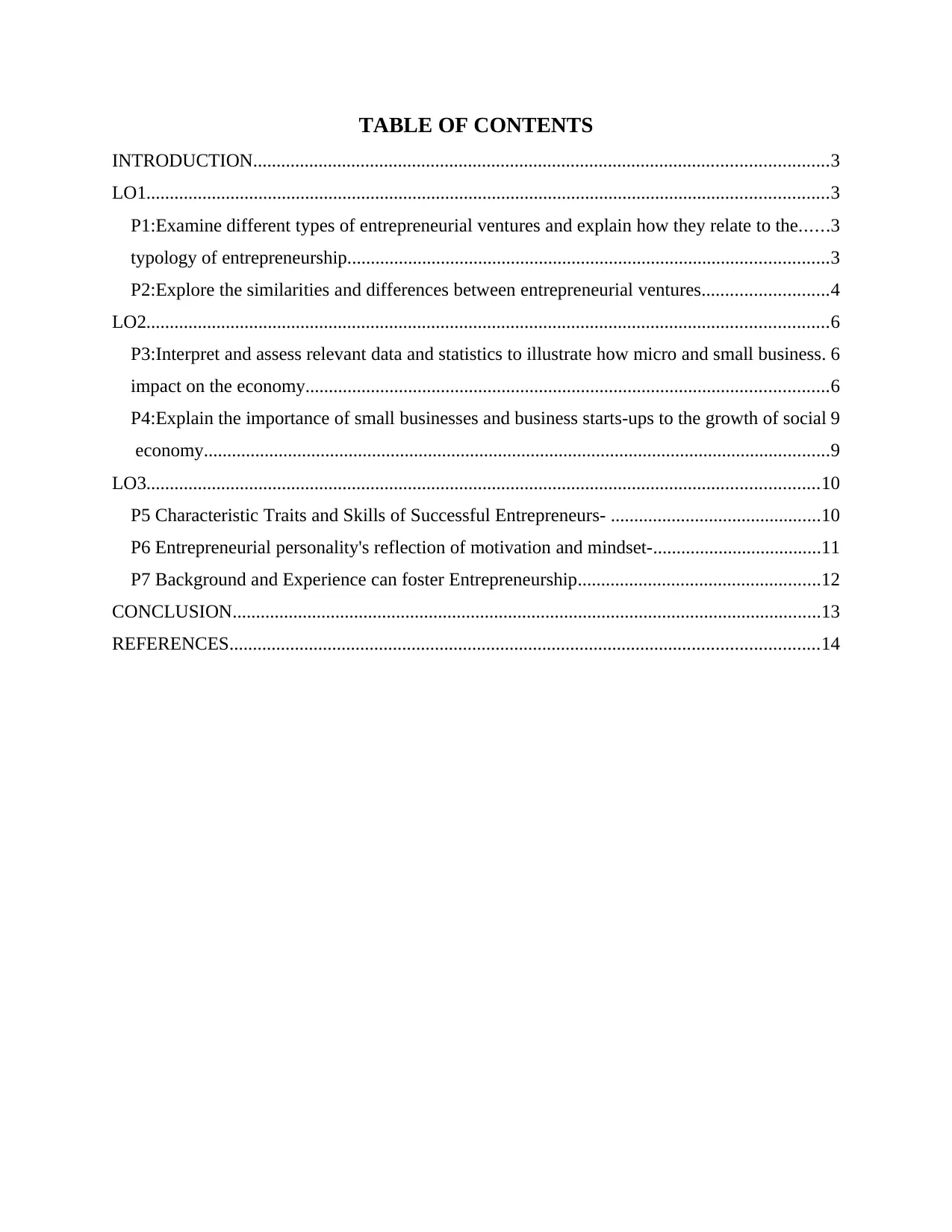
TABLE OF CONTENTS
INTRODUCTION...........................................................................................................................3
LO1..................................................................................................................................................3
P1:Examine different types of entrepreneurial ventures and explain how they relate to the......3
typology of entrepreneurship.......................................................................................................3
P2:Explore the similarities and differences between entrepreneurial ventures...........................4
LO2..................................................................................................................................................6
P3:Interpret and assess relevant data and statistics to illustrate how micro and small business. 6
impact on the economy................................................................................................................6
P4:Explain the importance of small businesses and business starts-ups to the growth of social 9
economy......................................................................................................................................9
LO3................................................................................................................................................10
P5 Characteristic Traits and Skills of Successful Entrepreneurs- .............................................10
P6 Entrepreneurial personality's reflection of motivation and mindset-....................................11
P7 Background and Experience can foster Entrepreneurship....................................................12
CONCLUSION..............................................................................................................................13
REFERENCES..............................................................................................................................14
INTRODUCTION...........................................................................................................................3
LO1..................................................................................................................................................3
P1:Examine different types of entrepreneurial ventures and explain how they relate to the......3
typology of entrepreneurship.......................................................................................................3
P2:Explore the similarities and differences between entrepreneurial ventures...........................4
LO2..................................................................................................................................................6
P3:Interpret and assess relevant data and statistics to illustrate how micro and small business. 6
impact on the economy................................................................................................................6
P4:Explain the importance of small businesses and business starts-ups to the growth of social 9
economy......................................................................................................................................9
LO3................................................................................................................................................10
P5 Characteristic Traits and Skills of Successful Entrepreneurs- .............................................10
P6 Entrepreneurial personality's reflection of motivation and mindset-....................................11
P7 Background and Experience can foster Entrepreneurship....................................................12
CONCLUSION..............................................................................................................................13
REFERENCES..............................................................................................................................14

INTRODUCTION
Entrepreneurship is the process to set up a business by analysing different risk factors or
is it successful or not. This includes the financial and managerial activities. Entrepreneurial
venture is about explaining the different structure of the businesses and ownership. Entrepreneur
need to have particular skills and characteristics to develop and manage a business. They have
innovative ideas. The experience and personal background can affect the entrepreneurship in
many ways either it leads to foster of hinder a business. This report carries the study of the types
of entrepreneurial ventures, their influence on the economy of the country. Except this, the
entrepreneurs mindset and personal background, previous experiences and their qualities is
studied, how they affect a business, which business type is suitable for the economic growth,
how they increase their business in market, strategies they follow.
LO1
P1:Examine different types of entrepreneurial ventures and explain how they relate to the
typology of entrepreneurship.
Similarities and differences between public, private and voluntary organisation:
Differences-
Public sectors: These are the sectors which consists of the organisations that are particularly
owned as well as operated by the government. The main purpose of is to provide services to
citizens of the country for example British Petroleum is public organisation.
Private sectors: These are the sectors which comprises of the organisations which may be in
partnership or corporation or an agency or a person. These organisations are not operated by
public body. The main purpose these organisations is to achieve higher profitability for example
ASDA.
Social sectors: These are the sectors which are also called voluntary sectors which are the group
of individuals who voluntarily enter in to the agreement to form an organisation in order to
accomplish a purpose. Main purpose of these voluntary organisations is to serve the humanity for
example OXFAM.
Similarities- All of the sectors need to operate their business in a legal manner as per the rules
and regulations. Also, each of these sector needs to provide high quality products and services to
customers.
Entrepreneurship is the process to set up a business by analysing different risk factors or
is it successful or not. This includes the financial and managerial activities. Entrepreneurial
venture is about explaining the different structure of the businesses and ownership. Entrepreneur
need to have particular skills and characteristics to develop and manage a business. They have
innovative ideas. The experience and personal background can affect the entrepreneurship in
many ways either it leads to foster of hinder a business. This report carries the study of the types
of entrepreneurial ventures, their influence on the economy of the country. Except this, the
entrepreneurs mindset and personal background, previous experiences and their qualities is
studied, how they affect a business, which business type is suitable for the economic growth,
how they increase their business in market, strategies they follow.
LO1
P1:Examine different types of entrepreneurial ventures and explain how they relate to the
typology of entrepreneurship.
Similarities and differences between public, private and voluntary organisation:
Differences-
Public sectors: These are the sectors which consists of the organisations that are particularly
owned as well as operated by the government. The main purpose of is to provide services to
citizens of the country for example British Petroleum is public organisation.
Private sectors: These are the sectors which comprises of the organisations which may be in
partnership or corporation or an agency or a person. These organisations are not operated by
public body. The main purpose these organisations is to achieve higher profitability for example
ASDA.
Social sectors: These are the sectors which are also called voluntary sectors which are the group
of individuals who voluntarily enter in to the agreement to form an organisation in order to
accomplish a purpose. Main purpose of these voluntary organisations is to serve the humanity for
example OXFAM.
Similarities- All of the sectors need to operate their business in a legal manner as per the rules
and regulations. Also, each of these sector needs to provide high quality products and services to
customers.
⊘ This is a preview!⊘
Do you want full access?
Subscribe today to unlock all pages.

Trusted by 1+ million students worldwide
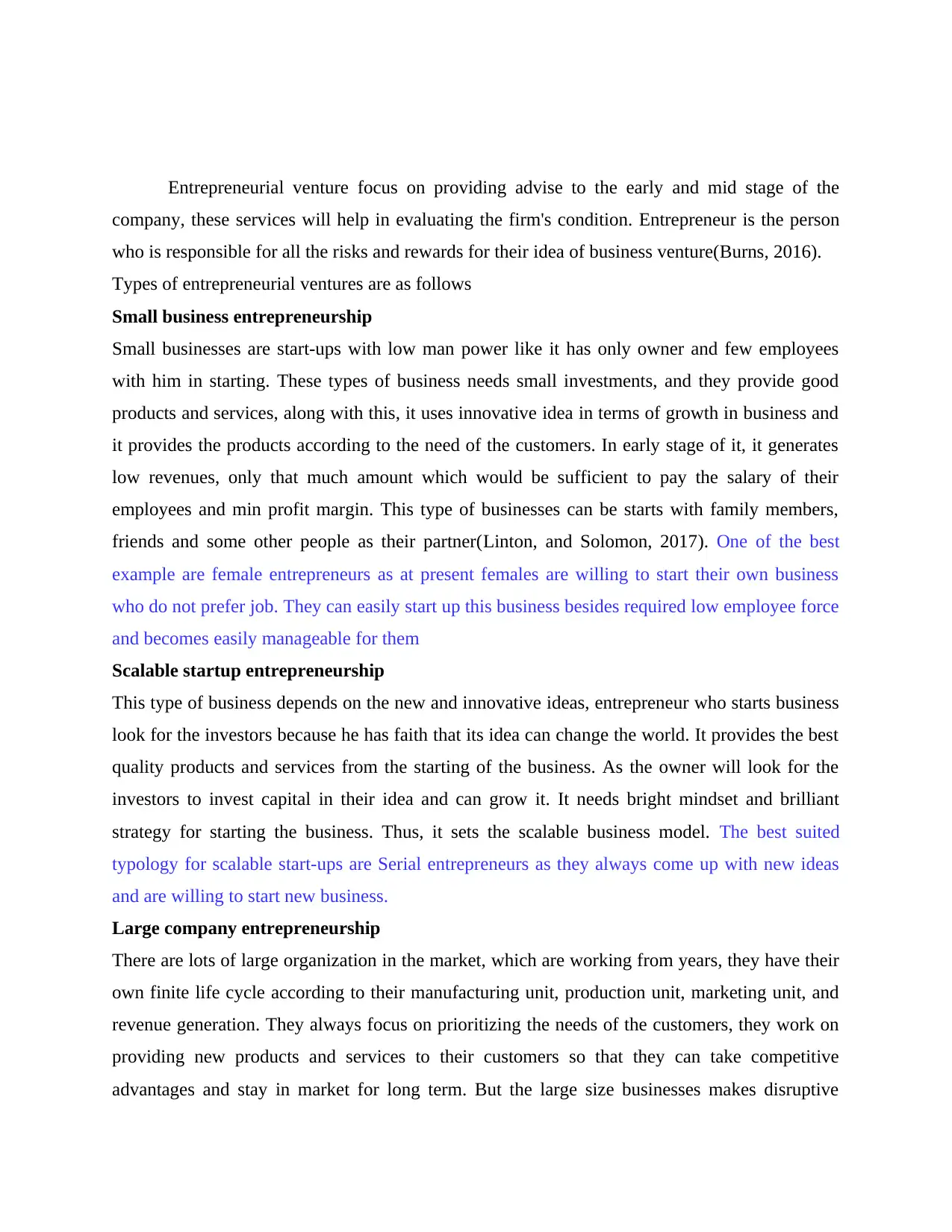
Entrepreneurial venture focus on providing advise to the early and mid stage of the
company, these services will help in evaluating the firm's condition. Entrepreneur is the person
who is responsible for all the risks and rewards for their idea of business venture(Burns, 2016).
Types of entrepreneurial ventures are as follows
Small business entrepreneurship
Small businesses are start-ups with low man power like it has only owner and few employees
with him in starting. These types of business needs small investments, and they provide good
products and services, along with this, it uses innovative idea in terms of growth in business and
it provides the products according to the need of the customers. In early stage of it, it generates
low revenues, only that much amount which would be sufficient to pay the salary of their
employees and min profit margin. This type of businesses can be starts with family members,
friends and some other people as their partner(Linton, and Solomon, 2017). One of the best
example are female entrepreneurs as at present females are willing to start their own business
who do not prefer job. They can easily start up this business besides required low employee force
and becomes easily manageable for them
Scalable startup entrepreneurship
This type of business depends on the new and innovative ideas, entrepreneur who starts business
look for the investors because he has faith that its idea can change the world. It provides the best
quality products and services from the starting of the business. As the owner will look for the
investors to invest capital in their idea and can grow it. It needs bright mindset and brilliant
strategy for starting the business. Thus, it sets the scalable business model. The best suited
typology for scalable start-ups are Serial entrepreneurs as they always come up with new ideas
and are willing to start new business.
Large company entrepreneurship
There are lots of large organization in the market, which are working from years, they have their
own finite life cycle according to their manufacturing unit, production unit, marketing unit, and
revenue generation. They always focus on prioritizing the needs of the customers, they work on
providing new products and services to their customers so that they can take competitive
advantages and stay in market for long term. But the large size businesses makes disruptive
company, these services will help in evaluating the firm's condition. Entrepreneur is the person
who is responsible for all the risks and rewards for their idea of business venture(Burns, 2016).
Types of entrepreneurial ventures are as follows
Small business entrepreneurship
Small businesses are start-ups with low man power like it has only owner and few employees
with him in starting. These types of business needs small investments, and they provide good
products and services, along with this, it uses innovative idea in terms of growth in business and
it provides the products according to the need of the customers. In early stage of it, it generates
low revenues, only that much amount which would be sufficient to pay the salary of their
employees and min profit margin. This type of businesses can be starts with family members,
friends and some other people as their partner(Linton, and Solomon, 2017). One of the best
example are female entrepreneurs as at present females are willing to start their own business
who do not prefer job. They can easily start up this business besides required low employee force
and becomes easily manageable for them
Scalable startup entrepreneurship
This type of business depends on the new and innovative ideas, entrepreneur who starts business
look for the investors because he has faith that its idea can change the world. It provides the best
quality products and services from the starting of the business. As the owner will look for the
investors to invest capital in their idea and can grow it. It needs bright mindset and brilliant
strategy for starting the business. Thus, it sets the scalable business model. The best suited
typology for scalable start-ups are Serial entrepreneurs as they always come up with new ideas
and are willing to start new business.
Large company entrepreneurship
There are lots of large organization in the market, which are working from years, they have their
own finite life cycle according to their manufacturing unit, production unit, marketing unit, and
revenue generation. They always focus on prioritizing the needs of the customers, they work on
providing new products and services to their customers so that they can take competitive
advantages and stay in market for long term. But the large size businesses makes disruptive
Paraphrase This Document
Need a fresh take? Get an instant paraphrase of this document with our AI Paraphraser
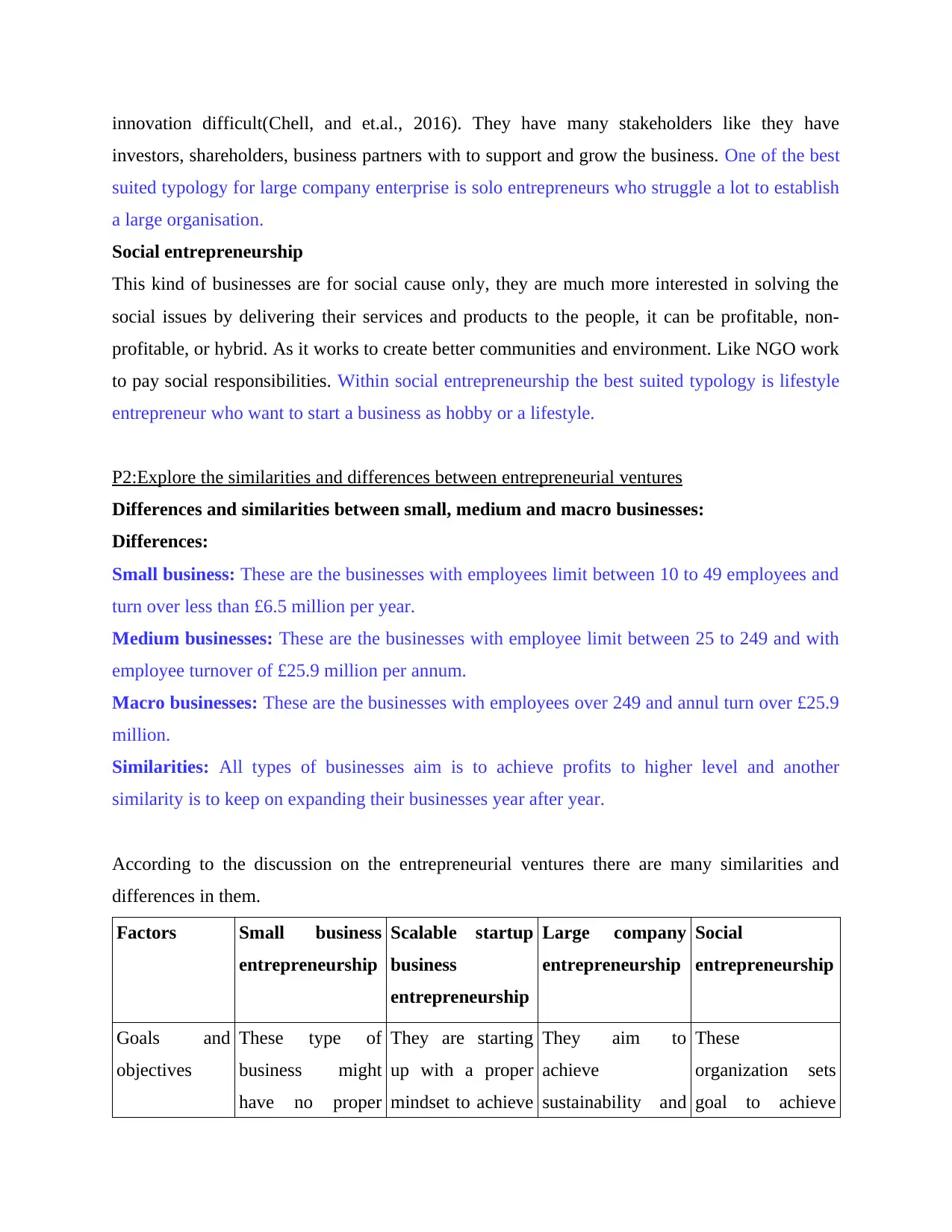
innovation difficult(Chell, and et.al., 2016). They have many stakeholders like they have
investors, shareholders, business partners with to support and grow the business. One of the best
suited typology for large company enterprise is solo entrepreneurs who struggle a lot to establish
a large organisation.
Social entrepreneurship
This kind of businesses are for social cause only, they are much more interested in solving the
social issues by delivering their services and products to the people, it can be profitable, non-
profitable, or hybrid. As it works to create better communities and environment. Like NGO work
to pay social responsibilities. Within social entrepreneurship the best suited typology is lifestyle
entrepreneur who want to start a business as hobby or a lifestyle.
P2:Explore the similarities and differences between entrepreneurial ventures
Differences and similarities between small, medium and macro businesses:
Differences:
Small business: These are the businesses with employees limit between 10 to 49 employees and
turn over less than £6.5 million per year.
Medium businesses: These are the businesses with employee limit between 25 to 249 and with
employee turnover of £25.9 million per annum.
Macro businesses: These are the businesses with employees over 249 and annul turn over £25.9
million.
Similarities: All types of businesses aim is to achieve profits to higher level and another
similarity is to keep on expanding their businesses year after year.
According to the discussion on the entrepreneurial ventures there are many similarities and
differences in them.
Factors Small business
entrepreneurship
Scalable startup
business
entrepreneurship
Large company
entrepreneurship
Social
entrepreneurship
Goals and
objectives
These type of
business might
have no proper
They are starting
up with a proper
mindset to achieve
They aim to
achieve
sustainability and
These
organization sets
goal to achieve
investors, shareholders, business partners with to support and grow the business. One of the best
suited typology for large company enterprise is solo entrepreneurs who struggle a lot to establish
a large organisation.
Social entrepreneurship
This kind of businesses are for social cause only, they are much more interested in solving the
social issues by delivering their services and products to the people, it can be profitable, non-
profitable, or hybrid. As it works to create better communities and environment. Like NGO work
to pay social responsibilities. Within social entrepreneurship the best suited typology is lifestyle
entrepreneur who want to start a business as hobby or a lifestyle.
P2:Explore the similarities and differences between entrepreneurial ventures
Differences and similarities between small, medium and macro businesses:
Differences:
Small business: These are the businesses with employees limit between 10 to 49 employees and
turn over less than £6.5 million per year.
Medium businesses: These are the businesses with employee limit between 25 to 249 and with
employee turnover of £25.9 million per annum.
Macro businesses: These are the businesses with employees over 249 and annul turn over £25.9
million.
Similarities: All types of businesses aim is to achieve profits to higher level and another
similarity is to keep on expanding their businesses year after year.
According to the discussion on the entrepreneurial ventures there are many similarities and
differences in them.
Factors Small business
entrepreneurship
Scalable startup
business
entrepreneurship
Large company
entrepreneurship
Social
entrepreneurship
Goals and
objectives
These type of
business might
have no proper
They are starting
up with a proper
mindset to achieve
They aim to
achieve
sustainability and
These
organization sets
goal to achieve
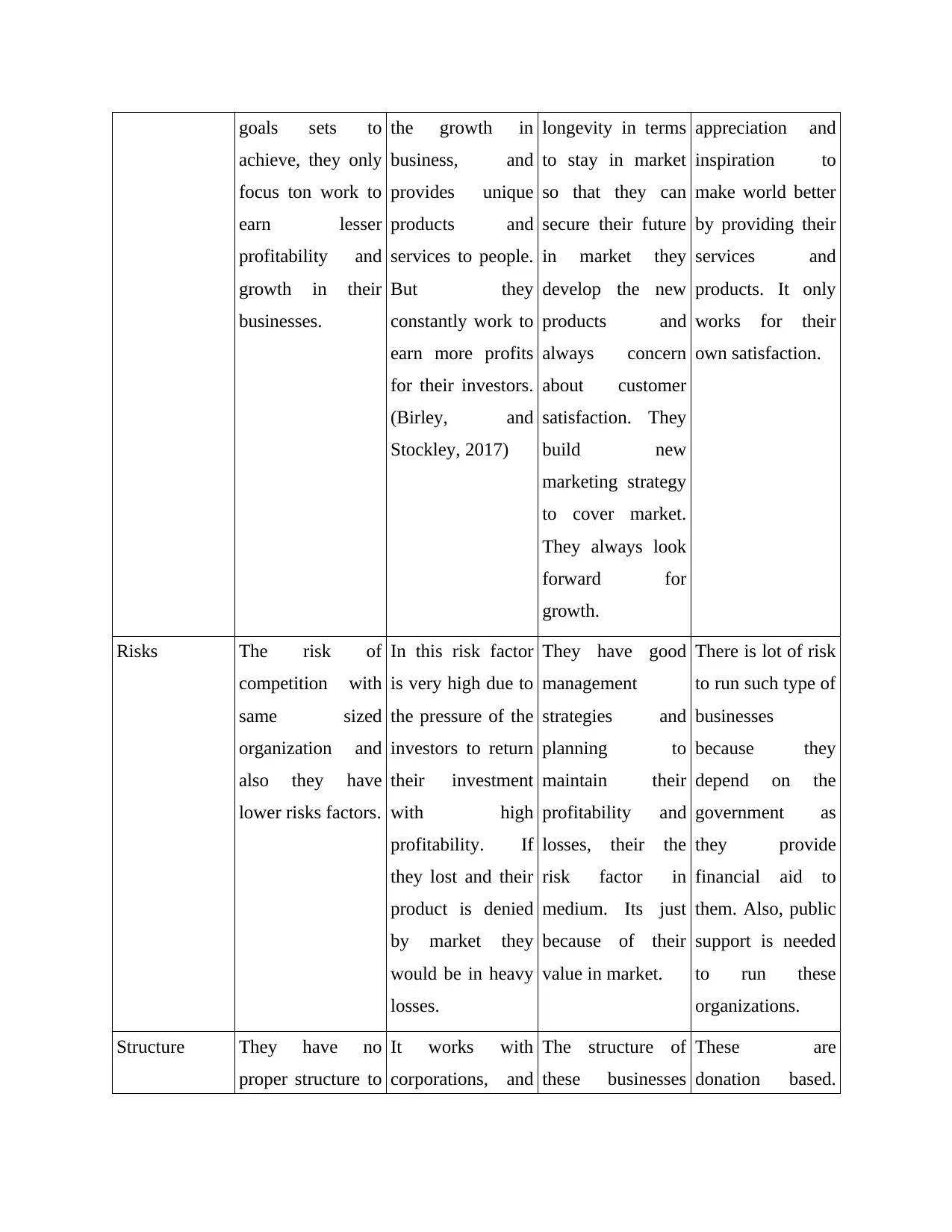
goals sets to
achieve, they only
focus ton work to
earn lesser
profitability and
growth in their
businesses.
the growth in
business, and
provides unique
products and
services to people.
But they
constantly work to
earn more profits
for their investors.
(Birley, and
Stockley, 2017)
longevity in terms
to stay in market
so that they can
secure their future
in market they
develop the new
products and
always concern
about customer
satisfaction. They
build new
marketing strategy
to cover market.
They always look
forward for
growth.
appreciation and
inspiration to
make world better
by providing their
services and
products. It only
works for their
own satisfaction.
Risks The risk of
competition with
same sized
organization and
also they have
lower risks factors.
In this risk factor
is very high due to
the pressure of the
investors to return
their investment
with high
profitability. If
they lost and their
product is denied
by market they
would be in heavy
losses.
They have good
management
strategies and
planning to
maintain their
profitability and
losses, their the
risk factor in
medium. Its just
because of their
value in market.
There is lot of risk
to run such type of
businesses
because they
depend on the
government as
they provide
financial aid to
them. Also, public
support is needed
to run these
organizations.
Structure They have no
proper structure to
It works with
corporations, and
The structure of
these businesses
These are
donation based.
achieve, they only
focus ton work to
earn lesser
profitability and
growth in their
businesses.
the growth in
business, and
provides unique
products and
services to people.
But they
constantly work to
earn more profits
for their investors.
(Birley, and
Stockley, 2017)
longevity in terms
to stay in market
so that they can
secure their future
in market they
develop the new
products and
always concern
about customer
satisfaction. They
build new
marketing strategy
to cover market.
They always look
forward for
growth.
appreciation and
inspiration to
make world better
by providing their
services and
products. It only
works for their
own satisfaction.
Risks The risk of
competition with
same sized
organization and
also they have
lower risks factors.
In this risk factor
is very high due to
the pressure of the
investors to return
their investment
with high
profitability. If
they lost and their
product is denied
by market they
would be in heavy
losses.
They have good
management
strategies and
planning to
maintain their
profitability and
losses, their the
risk factor in
medium. Its just
because of their
value in market.
There is lot of risk
to run such type of
businesses
because they
depend on the
government as
they provide
financial aid to
them. Also, public
support is needed
to run these
organizations.
Structure They have no
proper structure to
It works with
corporations, and
The structure of
these businesses
These are
donation based.
⊘ This is a preview!⊘
Do you want full access?
Subscribe today to unlock all pages.

Trusted by 1+ million students worldwide
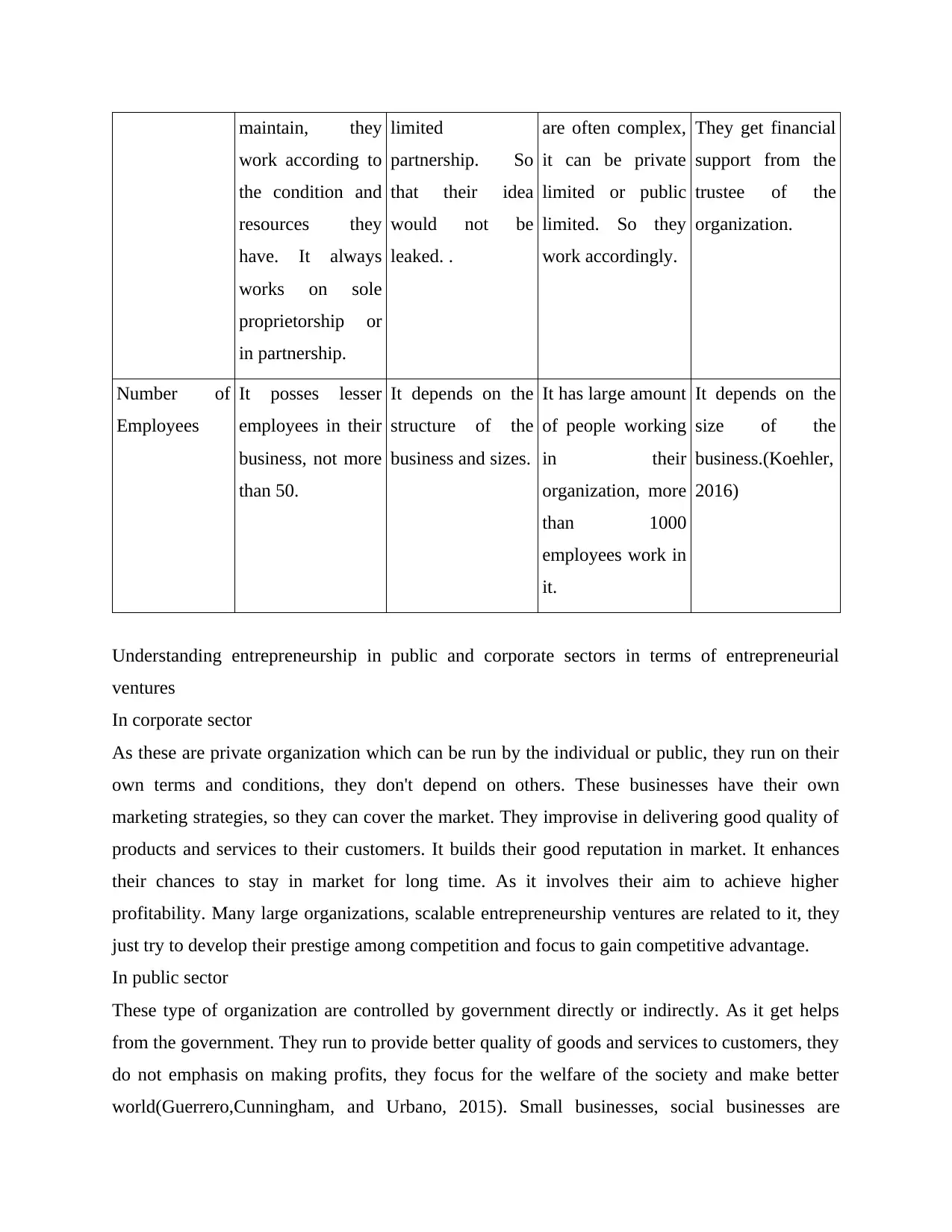
maintain, they
work according to
the condition and
resources they
have. It always
works on sole
proprietorship or
in partnership.
limited
partnership. So
that their idea
would not be
leaked. .
are often complex,
it can be private
limited or public
limited. So they
work accordingly.
They get financial
support from the
trustee of the
organization.
Number of
Employees
It posses lesser
employees in their
business, not more
than 50.
It depends on the
structure of the
business and sizes.
It has large amount
of people working
in their
organization, more
than 1000
employees work in
it.
It depends on the
size of the
business.(Koehler,
2016)
Understanding entrepreneurship in public and corporate sectors in terms of entrepreneurial
ventures
In corporate sector
As these are private organization which can be run by the individual or public, they run on their
own terms and conditions, they don't depend on others. These businesses have their own
marketing strategies, so they can cover the market. They improvise in delivering good quality of
products and services to their customers. It builds their good reputation in market. It enhances
their chances to stay in market for long time. As it involves their aim to achieve higher
profitability. Many large organizations, scalable entrepreneurship ventures are related to it, they
just try to develop their prestige among competition and focus to gain competitive advantage.
In public sector
These type of organization are controlled by government directly or indirectly. As it get helps
from the government. They run to provide better quality of goods and services to customers, they
do not emphasis on making profits, they focus for the welfare of the society and make better
world(Guerrero,Cunningham, and Urbano, 2015). Small businesses, social businesses are
work according to
the condition and
resources they
have. It always
works on sole
proprietorship or
in partnership.
limited
partnership. So
that their idea
would not be
leaked. .
are often complex,
it can be private
limited or public
limited. So they
work accordingly.
They get financial
support from the
trustee of the
organization.
Number of
Employees
It posses lesser
employees in their
business, not more
than 50.
It depends on the
structure of the
business and sizes.
It has large amount
of people working
in their
organization, more
than 1000
employees work in
it.
It depends on the
size of the
business.(Koehler,
2016)
Understanding entrepreneurship in public and corporate sectors in terms of entrepreneurial
ventures
In corporate sector
As these are private organization which can be run by the individual or public, they run on their
own terms and conditions, they don't depend on others. These businesses have their own
marketing strategies, so they can cover the market. They improvise in delivering good quality of
products and services to their customers. It builds their good reputation in market. It enhances
their chances to stay in market for long time. As it involves their aim to achieve higher
profitability. Many large organizations, scalable entrepreneurship ventures are related to it, they
just try to develop their prestige among competition and focus to gain competitive advantage.
In public sector
These type of organization are controlled by government directly or indirectly. As it get helps
from the government. They run to provide better quality of goods and services to customers, they
do not emphasis on making profits, they focus for the welfare of the society and make better
world(Guerrero,Cunningham, and Urbano, 2015). Small businesses, social businesses are
Paraphrase This Document
Need a fresh take? Get an instant paraphrase of this document with our AI Paraphraser
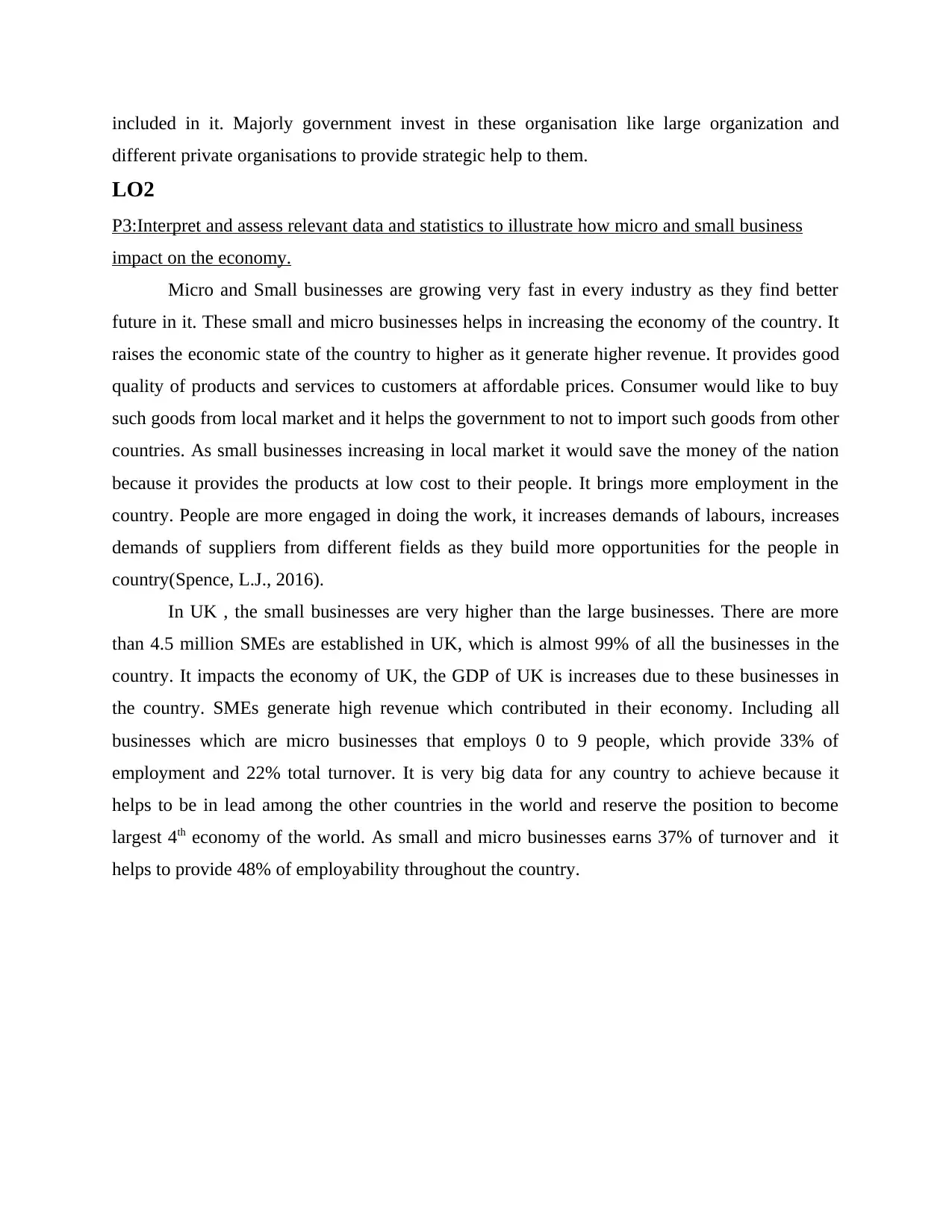
included in it. Majorly government invest in these organisation like large organization and
different private organisations to provide strategic help to them.
LO2
P3:Interpret and assess relevant data and statistics to illustrate how micro and small business
impact on the economy.
Micro and Small businesses are growing very fast in every industry as they find better
future in it. These small and micro businesses helps in increasing the economy of the country. It
raises the economic state of the country to higher as it generate higher revenue. It provides good
quality of products and services to customers at affordable prices. Consumer would like to buy
such goods from local market and it helps the government to not to import such goods from other
countries. As small businesses increasing in local market it would save the money of the nation
because it provides the products at low cost to their people. It brings more employment in the
country. People are more engaged in doing the work, it increases demands of labours, increases
demands of suppliers from different fields as they build more opportunities for the people in
country(Spence, L.J., 2016).
In UK , the small businesses are very higher than the large businesses. There are more
than 4.5 million SMEs are established in UK, which is almost 99% of all the businesses in the
country. It impacts the economy of UK, the GDP of UK is increases due to these businesses in
the country. SMEs generate high revenue which contributed in their economy. Including all
businesses which are micro businesses that employs 0 to 9 people, which provide 33% of
employment and 22% total turnover. It is very big data for any country to achieve because it
helps to be in lead among the other countries in the world and reserve the position to become
largest 4th economy of the world. As small and micro businesses earns 37% of turnover and it
helps to provide 48% of employability throughout the country.
different private organisations to provide strategic help to them.
LO2
P3:Interpret and assess relevant data and statistics to illustrate how micro and small business
impact on the economy.
Micro and Small businesses are growing very fast in every industry as they find better
future in it. These small and micro businesses helps in increasing the economy of the country. It
raises the economic state of the country to higher as it generate higher revenue. It provides good
quality of products and services to customers at affordable prices. Consumer would like to buy
such goods from local market and it helps the government to not to import such goods from other
countries. As small businesses increasing in local market it would save the money of the nation
because it provides the products at low cost to their people. It brings more employment in the
country. People are more engaged in doing the work, it increases demands of labours, increases
demands of suppliers from different fields as they build more opportunities for the people in
country(Spence, L.J., 2016).
In UK , the small businesses are very higher than the large businesses. There are more
than 4.5 million SMEs are established in UK, which is almost 99% of all the businesses in the
country. It impacts the economy of UK, the GDP of UK is increases due to these businesses in
the country. SMEs generate high revenue which contributed in their economy. Including all
businesses which are micro businesses that employs 0 to 9 people, which provide 33% of
employment and 22% total turnover. It is very big data for any country to achieve because it
helps to be in lead among the other countries in the world and reserve the position to become
largest 4th economy of the world. As small and micro businesses earns 37% of turnover and it
helps to provide 48% of employability throughout the country.

Illustration 1: Small business in UK economy
(Source: Small business in UK economy, 2018)
According to the graphical analysis, the SMEs are providing much larger amount of
employment in the country, this helps the normal people to live a healthy lifestyle, and they raise
their living standard. Per capita income is also affected as it increases in terms of the
employment raises. Also the SMEs are categorised as innovator, non-innovator, exporter, or
non-exporter, as they have new business ideas, new market planning, new strategies to grab the
market so they work on it, and get supported by the people. Large businesses have to develop
their business strategies according to new trends in market otherwise it will be fail to serve to
customers, this leads to make changes in their internal and external environment, it cost high
while the SMEs are already settled on small investments and low pricing of their products range
it helps to retain in market for long time(Radanliev, and et.al., 2019). As these SMEs generate
higher revenue, like they also export their products, they get foreign exchange currency and
contribute to the economy of the UK. Hence, the SMEs are more profitable and more advance in
(Source: Small business in UK economy, 2018)
According to the graphical analysis, the SMEs are providing much larger amount of
employment in the country, this helps the normal people to live a healthy lifestyle, and they raise
their living standard. Per capita income is also affected as it increases in terms of the
employment raises. Also the SMEs are categorised as innovator, non-innovator, exporter, or
non-exporter, as they have new business ideas, new market planning, new strategies to grab the
market so they work on it, and get supported by the people. Large businesses have to develop
their business strategies according to new trends in market otherwise it will be fail to serve to
customers, this leads to make changes in their internal and external environment, it cost high
while the SMEs are already settled on small investments and low pricing of their products range
it helps to retain in market for long time(Radanliev, and et.al., 2019). As these SMEs generate
higher revenue, like they also export their products, they get foreign exchange currency and
contribute to the economy of the UK. Hence, the SMEs are more profitable and more advance in
⊘ This is a preview!⊘
Do you want full access?
Subscribe today to unlock all pages.

Trusted by 1+ million students worldwide
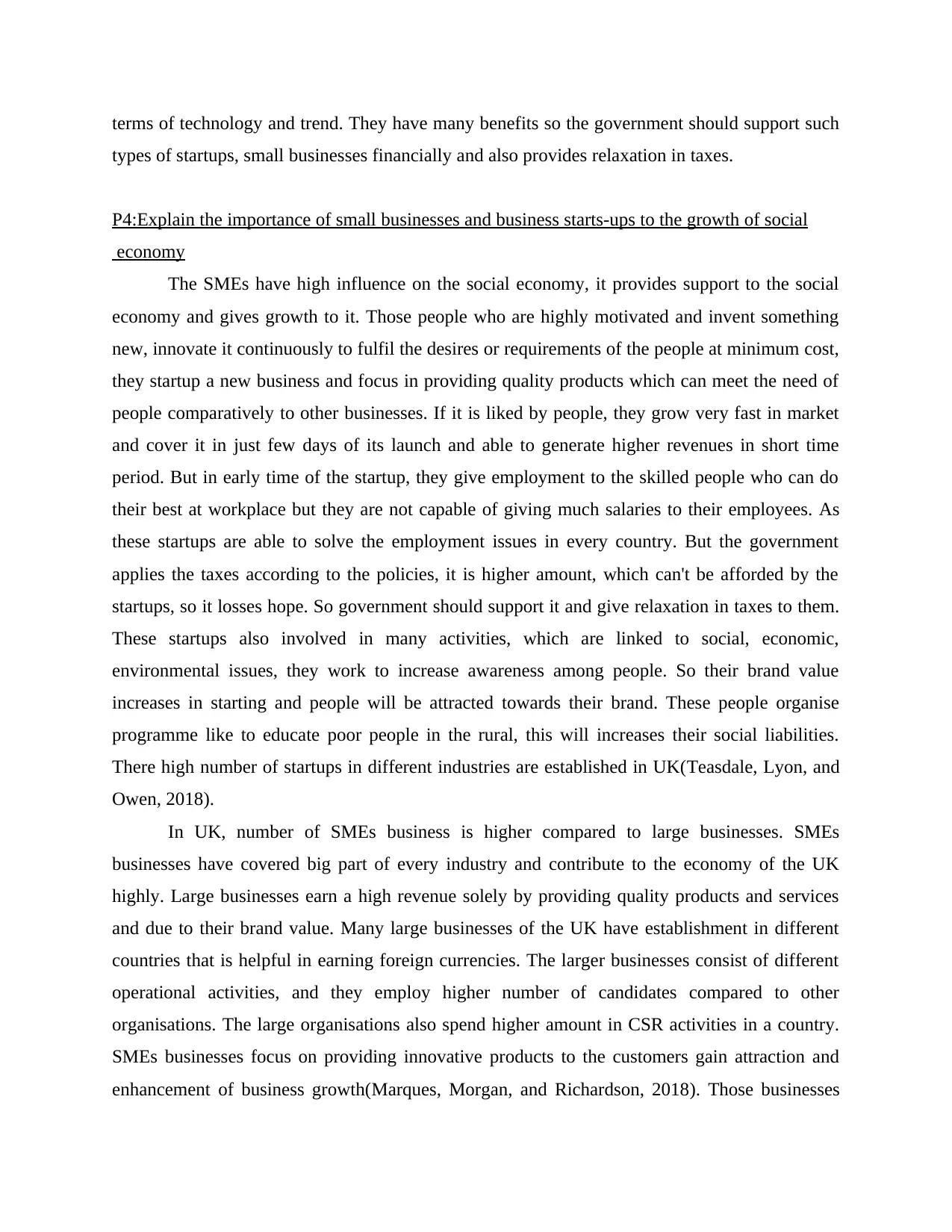
terms of technology and trend. They have many benefits so the government should support such
types of startups, small businesses financially and also provides relaxation in taxes.
P4:Explain the importance of small businesses and business starts-ups to the growth of social
economy
The SMEs have high influence on the social economy, it provides support to the social
economy and gives growth to it. Those people who are highly motivated and invent something
new, innovate it continuously to fulfil the desires or requirements of the people at minimum cost,
they startup a new business and focus in providing quality products which can meet the need of
people comparatively to other businesses. If it is liked by people, they grow very fast in market
and cover it in just few days of its launch and able to generate higher revenues in short time
period. But in early time of the startup, they give employment to the skilled people who can do
their best at workplace but they are not capable of giving much salaries to their employees. As
these startups are able to solve the employment issues in every country. But the government
applies the taxes according to the policies, it is higher amount, which can't be afforded by the
startups, so it losses hope. So government should support it and give relaxation in taxes to them.
These startups also involved in many activities, which are linked to social, economic,
environmental issues, they work to increase awareness among people. So their brand value
increases in starting and people will be attracted towards their brand. These people organise
programme like to educate poor people in the rural, this will increases their social liabilities.
There high number of startups in different industries are established in UK(Teasdale, Lyon, and
Owen, 2018).
In UK, number of SMEs business is higher compared to large businesses. SMEs
businesses have covered big part of every industry and contribute to the economy of the UK
highly. Large businesses earn a high revenue solely by providing quality products and services
and due to their brand value. Many large businesses of the UK have establishment in different
countries that is helpful in earning foreign currencies. The larger businesses consist of different
operational activities, and they employ higher number of candidates compared to other
organisations. The large organisations also spend higher amount in CSR activities in a country.
SMEs businesses focus on providing innovative products to the customers gain attraction and
enhancement of business growth(Marques, Morgan, and Richardson, 2018). Those businesses
types of startups, small businesses financially and also provides relaxation in taxes.
P4:Explain the importance of small businesses and business starts-ups to the growth of social
economy
The SMEs have high influence on the social economy, it provides support to the social
economy and gives growth to it. Those people who are highly motivated and invent something
new, innovate it continuously to fulfil the desires or requirements of the people at minimum cost,
they startup a new business and focus in providing quality products which can meet the need of
people comparatively to other businesses. If it is liked by people, they grow very fast in market
and cover it in just few days of its launch and able to generate higher revenues in short time
period. But in early time of the startup, they give employment to the skilled people who can do
their best at workplace but they are not capable of giving much salaries to their employees. As
these startups are able to solve the employment issues in every country. But the government
applies the taxes according to the policies, it is higher amount, which can't be afforded by the
startups, so it losses hope. So government should support it and give relaxation in taxes to them.
These startups also involved in many activities, which are linked to social, economic,
environmental issues, they work to increase awareness among people. So their brand value
increases in starting and people will be attracted towards their brand. These people organise
programme like to educate poor people in the rural, this will increases their social liabilities.
There high number of startups in different industries are established in UK(Teasdale, Lyon, and
Owen, 2018).
In UK, number of SMEs business is higher compared to large businesses. SMEs
businesses have covered big part of every industry and contribute to the economy of the UK
highly. Large businesses earn a high revenue solely by providing quality products and services
and due to their brand value. Many large businesses of the UK have establishment in different
countries that is helpful in earning foreign currencies. The larger businesses consist of different
operational activities, and they employ higher number of candidates compared to other
organisations. The large organisations also spend higher amount in CSR activities in a country.
SMEs businesses focus on providing innovative products to the customers gain attraction and
enhancement of business growth(Marques, Morgan, and Richardson, 2018). Those businesses
Paraphrase This Document
Need a fresh take? Get an instant paraphrase of this document with our AI Paraphraser

also export higher volume and employ high number of candidates in the UK that is helpful in
reducing unemployment.
LO3
P5 Characteristic Traits and Skills of Successful Entrepreneurs-
Every successful entrepreneur possess more or less characteristics that differentiate them
from other business manager. Some of these are mentioned below-
Highly Self Motivated- successful entrepreneurs are always self motivated. Motivation to
start something new, taking risk and accepting challenges whatever comes in their way of
success. Business managers often to motived by external factors such as money or other
incentives. This characteristics is inherent in a successful entrepreneur which is a big contributor
in their success.
Vision- Completion of Vision is a measurement of success. All the successful
entrepreneurs have a Vision which is clear and precise to them and they also have faith in that
vision (Carsrud, 2017). The path that will take them to their vision is also decided by these
entrepreneurs. Business managers do lack these vision they usually follow what is asked to them
by superiors or business owners. In case they know the vision then the path is decided by owners
of the business.
Decisiveness- Entrepreneurs' success depends on the decisions taken by them. Validity
and correctness is very important in all the decisions taken by entrepreneur so that they can bring
desired result along with these entrepreneurs also need to prioritise and can not procrastinate
their decisions and then their actions (Lecuna, Cohen and Chavez, 2017). Business managers
often depends on their superiors for major decisions and cannot take effective decisions like
successful entrepreneurs.
Leadership Skills- Entrepreneur who can influence, motivate and guide their team and
followers are considered to be successful they can make their team work according to them and
achieve desired result. Whereas business managers can only influence decision of others to their
authoritative limits and are followers of their superiors.
Communication Skills- Weather negotiating a deal, resolving conflicts or addressing a
meeting strong communication skill play a vital role in success of all these (Westhead and
Solesvik, 2016). Success entrepreneurs' must have and do have strong communication skills both
written and verbal. Business managers may not necessarily possess these skills. Communication
reducing unemployment.
LO3
P5 Characteristic Traits and Skills of Successful Entrepreneurs-
Every successful entrepreneur possess more or less characteristics that differentiate them
from other business manager. Some of these are mentioned below-
Highly Self Motivated- successful entrepreneurs are always self motivated. Motivation to
start something new, taking risk and accepting challenges whatever comes in their way of
success. Business managers often to motived by external factors such as money or other
incentives. This characteristics is inherent in a successful entrepreneur which is a big contributor
in their success.
Vision- Completion of Vision is a measurement of success. All the successful
entrepreneurs have a Vision which is clear and precise to them and they also have faith in that
vision (Carsrud, 2017). The path that will take them to their vision is also decided by these
entrepreneurs. Business managers do lack these vision they usually follow what is asked to them
by superiors or business owners. In case they know the vision then the path is decided by owners
of the business.
Decisiveness- Entrepreneurs' success depends on the decisions taken by them. Validity
and correctness is very important in all the decisions taken by entrepreneur so that they can bring
desired result along with these entrepreneurs also need to prioritise and can not procrastinate
their decisions and then their actions (Lecuna, Cohen and Chavez, 2017). Business managers
often depends on their superiors for major decisions and cannot take effective decisions like
successful entrepreneurs.
Leadership Skills- Entrepreneur who can influence, motivate and guide their team and
followers are considered to be successful they can make their team work according to them and
achieve desired result. Whereas business managers can only influence decision of others to their
authoritative limits and are followers of their superiors.
Communication Skills- Weather negotiating a deal, resolving conflicts or addressing a
meeting strong communication skill play a vital role in success of all these (Westhead and
Solesvik, 2016). Success entrepreneurs' must have and do have strong communication skills both
written and verbal. Business managers may not necessarily possess these skills. Communication
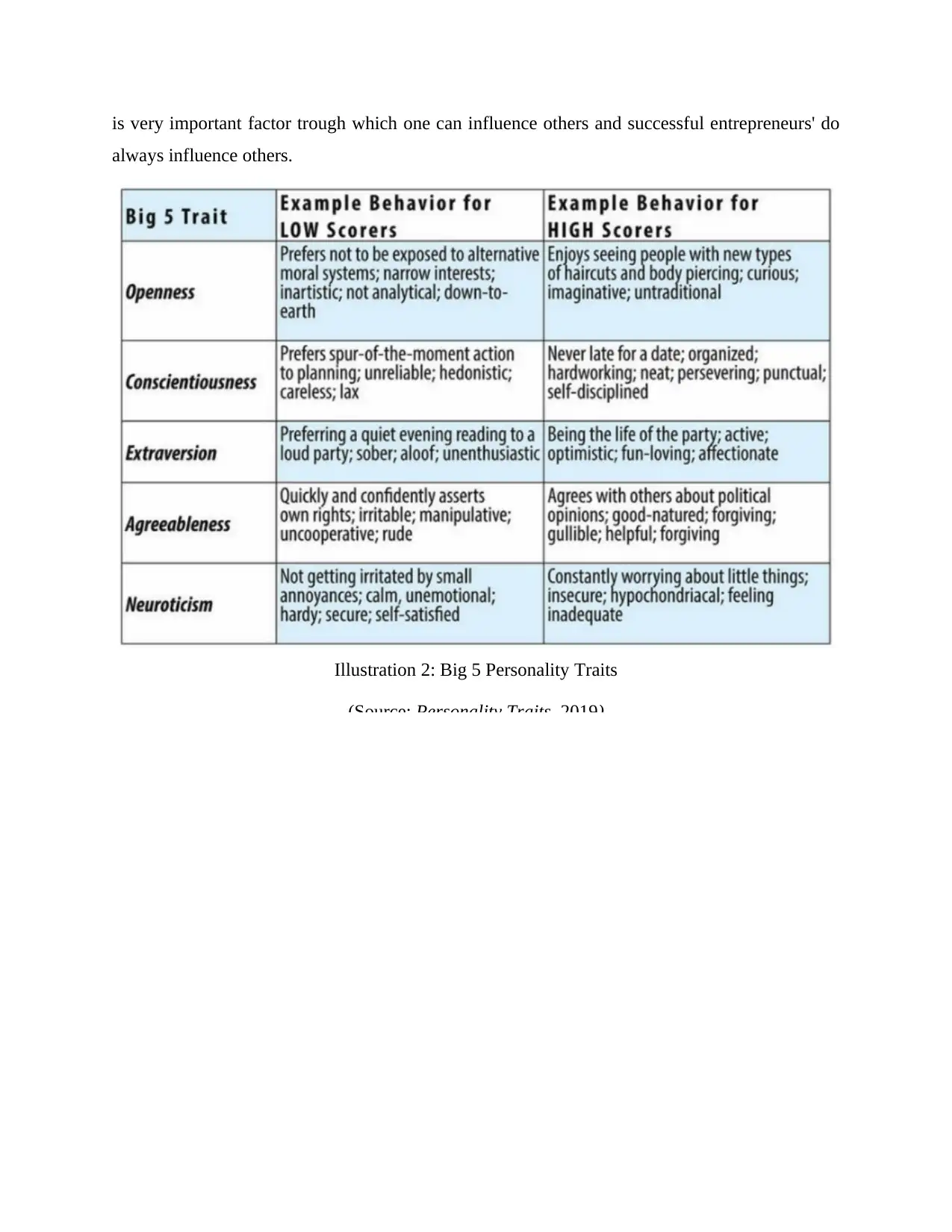
is very important factor trough which one can influence others and successful entrepreneurs' do
always influence others.
Illustration 2: Big 5 Personality Traits
(Source: Personality Traits, 2019)
always influence others.
Illustration 2: Big 5 Personality Traits
(Source: Personality Traits, 2019)
⊘ This is a preview!⊘
Do you want full access?
Subscribe today to unlock all pages.

Trusted by 1+ million students worldwide
1 out of 18
Related Documents
Your All-in-One AI-Powered Toolkit for Academic Success.
+13062052269
info@desklib.com
Available 24*7 on WhatsApp / Email
![[object Object]](/_next/static/media/star-bottom.7253800d.svg)
Unlock your academic potential
Copyright © 2020–2025 A2Z Services. All Rights Reserved. Developed and managed by ZUCOL.



